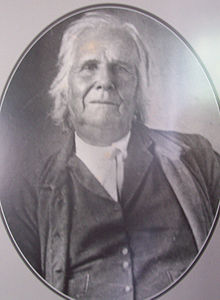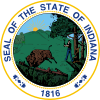- Dennis Pennington
-
Dennis Pennington 
Photo of Dennis Pennington on display in the Indiana First State Capitol Building Indiana Territorial Legislature
SpeakerIn office
1809–1816Preceded by None Succeeded by None Constituency Harrison County Indiana State Senate In office
Speaker
1816 – 1820In office
1825–1827In office
1830–1833In office
1842–1845Constituency Harrison County Indiana House of Representatives In office
1822–1824In office
1828–1830In office
1845–1846Constituency Harrison County Personal details Born May 18, 1776
Cumberland County, VirginiaDied December 2, 1854 (aged 78)
Harrison County, IndianaPolitical party Whig Party Spouse(s) Jenine Relations Walter Q. Gresham (Nephew) Residence Central Barren, Indiana Occupation Farmer Religion Methodist Nickname(s) "Uncle Dennis", "Father Pennington" Dennis Pennington (May 18, 1776–December 2, 1854) was an early legislator in Indiana and the Indiana Territory, speaker of the first Indiana State Senate, speaker of the territorial legislature, a member of the Whig Party serving over 37 years in public office, and one of the founders of Indiana. He was also a stonemason and member of the Grand Lodge of Indiana.[1] His major political contributions were his strong opposition of slavery and his support of squatter's rights, and he was responsible for the construction of Indiana's first state capitol building.
Contents
Early life
Dennis Pennington was born in Cumberland County, Virginia just before American Independence on May 18, 1776 to Edward Pennington.[2] He had four brothers and one sister. The Pennington family owned several slaves while they lived in Virginia, but freed them all when they left the state. One of the slaves, "Aunt Fannie", refused to be left behind. She stayed with Pennington's for the rest of her life as a free household servant, she later died as one of the several freed slaves living in Corydon.[3]
In the fall of 1773 the Penningtons moved to the frontier in Kentucky. They became friends of Henry Clay shortly after he moved to the territory. In 1799 Pennington supported Clay in his attempt to make Kentucky a "Free State". While Pennington lived in Kentucky, he farmed land east of Louisville and married his wife Elizabeth (English). In 1784 he crossed the Ohio River at Clarksville, Indiana and entered the Northwest Territory for the first time. There Pennington purchased land from George Rogers Clark near present day Lanesville, Indiana. He moved his family there and built a homestead to farm the land starting in 1802.[4] He moved again in 1815 to what is now Central Barren, Indiana, four miles north of Corydon.[5]
Political career
In the late 1790s Pennington was met Governor Saint Clair and Thomas Worthington. His contact with these men and their success with the anti-slavery movement in Ohio influenced Pennington decided to enter the anti-slavery movement in the Indiana Territory. He first met the pro-slavery governor of the Indiana Territory, William Henry Harrison, on a trip to Vincennes in 1801.[5] Initially Pennington supported Harrison's policies, but over time he was slowly roused to opposition. Pennington's first fray in the political world was his support for squatter's rights, much to the chagrin of George Rogers Clark, who was still a major landholder at the time in 1807.[6]
On December 28, 1802, Harrison attempted to have the anti-slavery clause of the Northwest Territory's charter dropped. Then in 1803 he introduced measures to allow indenturing within the territory, and finally in 1807 Harrison was nearly able to have slavery outright legalized by the appointed territorial legislature It was then that Pennington entered politic in open opposition of Harrison and the pro-slavery government.[6] Pennington went further in his speech at the Springville meeting and outright condemned slavery and the government that had legalized it. At the same meeting in Springfield the attendees drafted and adopted a resolution that condemned slavery in the territory and resolved to put an end to the "despised institution".[7]
In 1809 Congress reorganized the government of the Indiana Territory by making the legislature bicameral. They created a lower house in the legislature to be filled by popular election. The lower house was then to nominate a pool of men from whom the Governor could appoint to the upper house. This led to a major reduction in the governor's power.[8] Pennington was elected as the representative of Harrison County in the first election. Many of his anti-slavery cohorts were also elected in the first election giving them an overwhelming majority. Pennington quickly took the lead in the legislature and became speaker. He introduced and helped pass laws to repeal the slavery and indenturing laws implemented by Harrison.[3]
In 1809 Pennington was awarded the contract from the Territorial Legislature to build a courthouse for Harrison County. The building later became Indiana's first State Capitol. Construction cost about $1,500. After the territory was reorganized, and the outbreak of the War of 1812 Pennington wrote the resolution to relocate the capital.[9]
Resolved: That the capitol be removed from Vincennes, because it is dangerous to continue longer here on account of threatened depredations of the Indians, who may destroy our valuable records."[10]
Corydon was eventually selected, Pennington's hometown. By 1810 Pennington was the defacto leader of the territorial legislature. In 1813 Thomas Posey succeeded Harrison, who was heading the invasion of Canada, as governor. Posey succeeded Harrison as the head of the pro-slavery party. Pennington's constant attack against the pro-slavery party never ended and according to some sources it was his unrelenting political assault that drove Posey from the capital. Posey claimed it was poor health and that he needed to be nearer to his physician.[8]
In 1815 Pennington was the territory's census enumerator. He used the position to carry his anti-slavery platform to every home in the territory.[11] This laid the groundwork for the movement to prevent any chance of slavery entering the state's constitution that would be drawn up in the following year. Pennington is quoted as saying, "Let us be on our guard when our convention men are chosen that they be men opposed to slavery."[12]
Indiana statehood
In 1816 Pennington was elected as a delegate to Indiana's first Constitutional Convention.[13] As a slavery opponent, he was naturally in party with Jonathan Jennings. He and the other anti-slavery delegates had long since wanted to make Indiana permanently a "Free State". Pennington had encouraged Jennings to run for Congress against Harrison's candidate, and once there he further encouraged him to use his position to speed the territory's path to statehood. The hope was that upon statehood, the constitutional convention could be stacked against slavery, and then the state could elect its own governor rather than have it appointed by the President. They hoped that this would allow the state to be rid of any more pro-slavery governors.[14] At the constitutional convention they did just that, slavery was clearly banned in the new constitution and the Governor was banned from holding any federal position.
Article 8, Section 1: But, as the holding any part of the human Creation in slavery, or involuntary servitude, can only originate in usurpation and tyranny, no alteration of this constitution shall ever take place so as to introduce slavery or involuntary servitude in this State, otherwise than for the punishment of crimes, whereof the party shall have been duly convicted.
Dennis Pennington ran for a seat in the senate of the new government. He won the election and became the first speaker of the Indiana State Senate from 1816–1818. He was an outspoken critic of slavery and a Whig during his tenure as a state representative. Pennington served in the Indiana State Senate from 1816–1820, 1825–1827, 1830–1833, and 1842–1845. Pennington also served in the Indiana House of Representatives 1822–1824, 1828–1830, and 1845–1846.[1]
Ever the anti-slavery activist, in 1818, Pennington had three Kentuckians indicted for violating the state's "Man Stealing Act" when they forcibly took a black woman from a home in Harrison County and removed her to Kentucky. Governor Jennings requested that the Governor of Kentucky send the men to Indiana for trials; after several years of correspondence the governor of Kentucky refused on constitutional grounds. The incident caused governor Jennings to change his position on helping fugitive slaves escape and instead attempt to prevent them from entering the state.[15]
In 1825, Pennington campaigned for the position of Lieutenant Governor, but he was defeated. Later he was appointed to be the Sheriff of Harrison County, and ran to election for a second term. During his election campaign his opponent claimed due to Pennington's infirmities of age he would be unable to fulfill the duties of the office. Pennington challenged him to a wrestling match so that younger man could prove his superiority; his opponent declined. Pennington won that election and served as sheriff for second term.[16]
In the 1830s and 1840s Pennington was one of the most outspoken members of the General Assembly in opposition to the internal improvements plan. He was among the nine men, which included James Whitcomb, who voted against the Mammoth Internal Improvement Act. From the beginning, he railed against the majority; he claimed their plans, which would have no direct benefits for his constituency, would only bankrupt the state and would quickly become obsolete by the railroads. His predictions ended up being nearly correct. Every company started for internal improvements was bankrupt by 1840 and the state was only able to keep one canal out of all the projects and lost over ten million dollars, the equivalent of fifteen years of tax revenue, in the process.[17] The final canal was taken by creditors in 1842, leaving the state with nothing for all the money it invested.
In his later years Pennington served for a decade on the Indiana University Board of Trustees. By the 1840s he was the oldest man in the General Assembly and was affectionately called "Uncle Dennis" and "Father Pennington".[17][18] He died in his Harrison County home on September 2, 1854, aged 78, and was buried in the Pennington Chapel Cemetery.[1]
See also
Notes
- ^ a b c "Harrison, County Indiana". The Political Graveyard. http://www.politicalgraveyard.com/geo/IN/HR.html. Retrieved 2009-02-22.
- ^ Gresham, p. 13
- ^ a b Gresham, p. 23
- ^ Esarey, p. 206
- ^ a b Gresham p. 19
- ^ a b Gresham, p. 21
- ^ Gresham, pp. 21–22
- ^ a b Gresham, p. 22
- ^ Walker, p. 22
- ^ Gresham, p. 25
- ^ Gresham, p. 24
- ^ Levering, p. 139
- ^ "Members of the Constitutional Convention of 1816". Indiana Historical Bureau. http://www.in.gov/history/6044.htm. Retrieved 2009-02-22.
- ^ Gresham, pp. 22–23
- ^ Gresham, p. 42
- ^ Gresham, p. 11
- ^ a b Dunn, p. 408
- ^ "IU Board Members". Indiana University. http://www.indiana.edu/~trustees/former%20trustees%20by%20academic%20year.shtml. Retrieved 2008-09-19.
References
- Dunn, Jacob Piatt (©1919). Indiana and Indianans. V.I. Chicago & New York: The American Historical Society. http://books.google.com/books?id=GmcPryCCxFIC&.
- Gresham,Matilda (1919). Life of Walter Quintin Gresham 1832–1895. Rand McNally & company.
- Levering, Julia Henderson (©1909). Historic Indiana. New York & London: G. P. Putnam's sons. http://books.google.com/books?id=ja-tjo3-FtwC.
External links
- "Dennis Pennington". Find a Grave. http://www.findagrave.com/cgi-bin/fg.cgi?page=gr&GRid=15566936. Retrieved August 30, 2010.
- "Dennis Pennington Room". Kinter House. http://www.kintnerhouse.com/dennispenningtonroom.htm.
Categories:- 1776 births
- 1854 deaths
- People from Cumberland County, Virginia
- People from Harrison County, Indiana
- Indiana Territory officials
- Members of the Indiana Territorial Legislature
- Indiana State Senators
- Members of the Indiana House of Representatives
- Delegates to the 1816 Indiana constitutional convention
- Indiana Whigs
Wikimedia Foundation. 2010.




